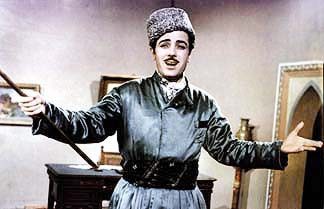History of cinema in Azerbaijan
Early History
The history of Azerbaijani film industry begins from 1898. In the end on the 19th century, the first filming apparatus “Cinemantographe” invented by French Lumiere brothers, appeared in Baku.
Alexandre Michon, the French photographer and cameraman, who lived in Baku more than 25 years, can be regarded as one of the establishers of film industry in Azerbaijan. He opened photo studio and created photo circle in Baku. During his activity in Azerbaijan, between 1879 and 1905, Michon made photos of landscapes, oil extraction and refining processes, oil gushers and fires in the oil fields. In 1898, Michon began depicting everyday life in Baku in his motion pictures, in line of them there are The Folk Dance of Caucasus, The Oil Gush Fire in Bibiheybat. The first film was used in a documentary, but the scenes of the latter were included in a film commemorating the 100th anniversary of world cinema.
The Newspaper Announcement about Michon’s films:
“On Sunday, August 2, 1898, A. Michon, will show some motion pictures that he has taken with a Lumière movie camera and which has been improved by the engineer Jules Carpentier. These films of the Caucasus and Central Asia have been prepared for the forthcoming International Paris Exhibition and will be presented only once in Baku at the V. I. Vasilyev-Vyatski Circus Theater.

Early 20th century
In the following years film industry in Azerbaijan continued to develop. In 1915 Film production laboratory was established in Baku by the Pirone brothers. With their invitation director Boris Svetlov shot films such as The Woman, An Hour before His Death and An Old Story in a New Manner in Baku. The most successful film was the Realm of Oil and Millions, casted also by the well-known Azerbaijani actor Huseyn Arablinski.
In 1916 Svetlov directed the first version of “Arshin Mal Alan”. The roles of Gulchohra and aunt Jahan were played by men, Ahman Aghdamski and Y.Narimanov respectively, as women were not allowed to act on stage. The music of operetta was performed by in-house musicians.
In 1919 a new film was produced in Azerbaijan, in the years of Azerbaijani Democratic Republic. The Celebration of the Anniversary of Azerbaijani Independence had its premier in 1919 June.

Soviet period
New period of Azerbaijani cinema began with the announcement of Soviet regime in the country.
The first step of this regime was nationalisation of cinema. As the all areas of life, cinema centralized under state bodies and state control imposed on cinema, films shot and the Soviet ideology was the leading theme and idea of films.
The state body regulating film industry was film section under the Art department of People’s Education Commissariat chaired by Hanafi Teregulov and great composer and opera singer Muslim Magomayev. In 1922 the forerunner of current Azerbaijanfilm studio was founded being the first cinema production company. Established in 1923, Azerbaijan Photo Film Industry (APFI) controlled nationalization process of all movie houses and distribution bureaus.
Maiden Tower became the first film of Azerbaijani Soviet production in 1924.
But despite of all pressures and state control, many Azernbaijani films were shot in those years. “Bakılılar”, “O olmasın bu olsun”, “Arşın mal alan”, “Qızmar günəş altında”, “Bir məhəlləli iki oğlan”, “Sən niyə susursan”, “İstintaq davam edir”, “Onu bağışlamaq olarmı” “Ulduz”, “Görüş”, “Nəsimi”, “Yeddi oğul istərəm”, “Dəli Kür”, “Axırıncı aşırım”, “Mən ki gözəl deyildim”, “Bəxtiyar”, “Əhməd haradadır”, “Şərikli çörək” , “Bəyin oğurlanması”, “Papaq”, “Gün keçdi”, “Təhminə” and other films are still watched with great pleasure.

Cinema in Azerbaijan Republic
The political independence gained on October 18, 1991, heralded new era of Azerbaijani culture. The change is being observed in the ideas and themes of films. The first Baku International Film Festival East-West was held in Baku. As a sign of the care to national film industry August 2 is celebrated as the professional holiday of filmmakers. Although the political changes, Garabagh war, turmoil and socio-economic crisis in early 90s affected the national film industry and blocked its further development, in recent years the cinema has adopted new pace and entered the new stage of development.
In 90s the patriotic themes were leading in the film industry. “Hope”, “Boy on the white horse”, “Cry”, “We will come back” and the other films screen the hardships of the war, patriotism, heroism and hope to the victory.
Hardships confronted in the film industry, were accompanied by international success in film festivals. In 1996, “The other time” film by Huseyn Mehdizade was nominated in the International Madrid Festival for the Best Director and the Best Young Actress and awarded with Gold Sibilla and Silver Sibilla. “Ovsuncu” by Ogtay Mirgasimov, “Sari gelin” (Blonde Bride) by Yavar Rzayev, “Girov” (Hostage) by Eldar Guliyev were awarded in international festivals.
